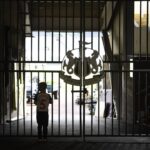The Wall Street Journal has an fascinating article detailing how campus protest leaders have adopted strategies and tactics from national organizations and external activists. It kicks off with:
The recent surge of pro-Palestinian protests on college campuses caught many off guard. However, the political maneuvering behind these demonstrations was the result of extensive training, planning, and encouragement from seasoned activists and leftist groups.
At Columbia University, leading up to the dismantling of encampments on the NYC campus and the eviction of protestors from an academic building, student organizers collaborated with entities like the National Students for Justice in Palestine, seasoned campaigners of campus protests, and former Black Panthers.
They delved into past protests against Columbia’s expansion into Harlem, participated in a community meeting on gentrification and development, and drew parallels with the Palestinian-Israeli land dispute. They also attended a “teach-in” led by former Black Panthers, who emphasized the importance of managing internal conflicts within their movement.
“We gleaned insights from our mentors, engaged in meaningful conversations with them, and analyzed the university’s responses to previous protests,” shared Sueda Polat, a graduate student and pro-Palestinian encampment organizer.
. . .
Focusing on Columbia, the article highlights how the current protests are an outgrowth of earlier initiatives and clashes between protestors and the university.
In March, Columbia had a “Resistance 101” training session planned featuring guest speakers, including long-time activists from Samidoun: Palestinian Prisoner Solidarity Network, a Vancouver-based group that applauded the Oct. 7 Hamas attack on Israel. Despite the administration’s two attempts to block the event due to some organizers’ known ties to terrorism and promotion of violence, Columbia students proceeded with the virtual event, leading to the suspension of several by President Minouche Shafik. . . .
“There is nothing wrong with being a member of Hamas, being a leader of Hamas, being a fighter in Hamas,” stated Samidoun coordinator Charlotte Kates. “These individuals are at the forefront defending Palestine.”
Samidoun did not respond to email inquiries. The German government banned the group last November, citing its support for terrorism and antisemitism, and incitement of violence to advance political agendas.
The article also delves into the funding of such training and coordination, revealing that National Students for Justice in Palestine (subject to a recently filed lawsuit alleging links to Hamas or Hamas-affiliated entities) receives funding from the Wespac Foundation, a New York-based non-profit. It illustrates how NSJP provides tactics and aligns messaging for its various campus chapters.





